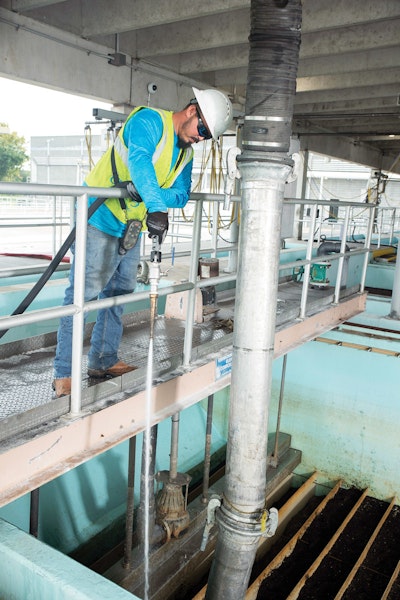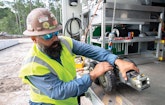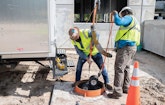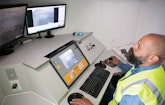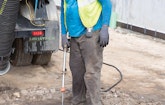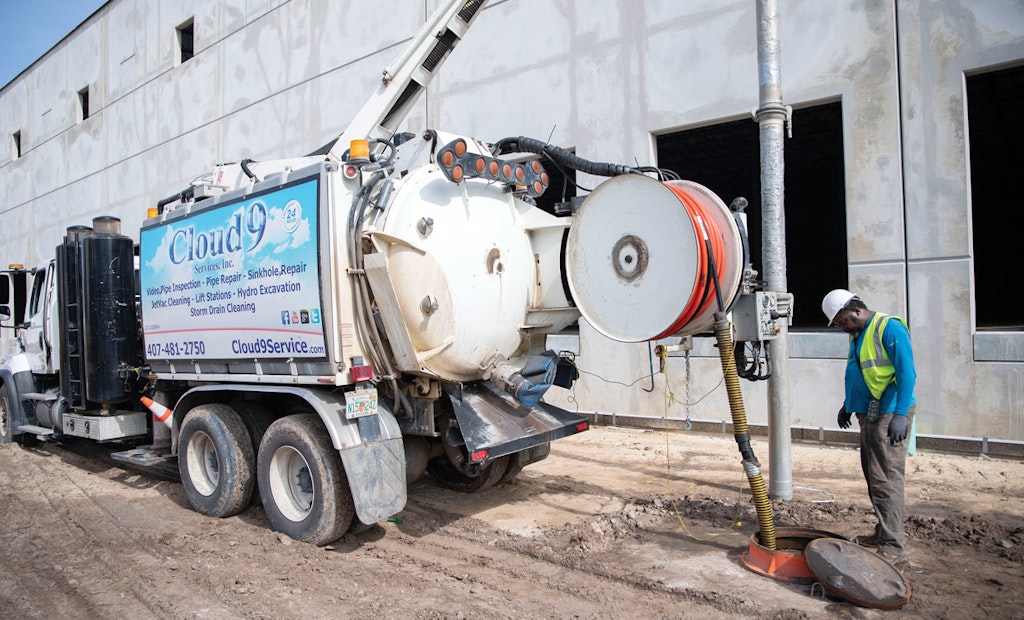
Technician David Carti operates an Aquatech B10 combination sewer truck to clean out storm drainlines at an warehouse construction site in Orlando.
Interested in Inspection?
Get Inspection articles, news and videos right in your inbox! Sign up now.
Inspection + Get AlertsWhen construction-industry veteran Rick Fender was thinking about what to name his new plumbing and utility company back in 2001, he set the bar high and chose Cloud 9 Services, an aspirational name if there ever was one.
“I was looking for a catchy name,” he says. “I’d visited Singapore at the time and had Buddhist friends, plus I was reading a book about the Dalai Lama. I figured we wanted happy customers who’d feel like they were on cloud nine [a stage of enlightenment in Buddhism].
“It seems to be working for us.”
Creating happy customers doesn’t happen overnight, however. Building a reputation and generating word-of-mouth referrals occurs job by job over the course of time. It also requires significant investments to buy advanced equipment and machines that boost customer satisfaction by helping the company complete jobs faster and at competitive prices, Fender says.
Moreover, it takes time to add complementary services — such as hydroexcavation, pipe lining and pipe coating — that also create happy customers by fulfilling all their service needs with just one call.
But after 20 years in business in Orlando, Florida, Fender’s formula for slow but steady growth has created a customer-centric company with a reputation for tackling tough plumbing and underground utility jobs (with an emphasis on pipeline cleaning and inspections), thanks to a combination of cutting-edge technology and experienced technicians.
Fender also gives much credit to his wife, Lucy Fender, a certified public accountant who serves as the company’s president and chief executive officer. She’s also the majority owner, he says.
“When she took over the books, we started doing much better,” Fender says. “We had acquired a lot of debt during the [2008-09] recession, but we kept working to pay it down. And within four years, we were looking pretty good — and we’ve done really well since then.”
Gaining experience
Fender, 68, has worked in the construction industry for decades. In the early 1980s, he and his brothers — Pat, Mike and Kevin — formed Pat’s Pump & Blower, which focused on installing and repairing lift stations and performing sewer-utility construction work and repairs. After a stint in residential remodeling, Fender then moved into marine construction, work that included building boat houses and sea walls throughout Florida.
Eager to do something different, Fender in 2001 turned again to the field he says he knew best: doing repair and maintenance work at wastewater treatment plants and for lift stations.
Around 2005, the company entered the market for waterjetting/vacuuming and inspecting sewer lines.
“My brother Pat suggested it because I was looking for someone to do a jet-vac job for us,” Fender recalls. “He said, ‘Why don’t you just get your own vacuum truck?’ Once we started to focus on that market, we knew that was it.”
The investment made sense at the time because competition was limited and the price of even a used vacuum truck deterred competitors from entering the market. That’s not true anymore, Fender says, noting that upstart companies tend to low-ball their prices to win work.
“But that’s where being around so long and having built a good reputation pays dividends. Customers might use someone else because they charge less, but eventually they realize that you get what you pay for.”
Branching out
As customer needs expanded, so did the company’s services, which now include hydroexcavation (primarily exposing underground lines for utilities), pipe lining, pipe coating and pipeline inspections. Primary customers are general contractors, industrial plants, state agencies and municipalities, commercial businesses and property-management companies, he says.
“Our services work hand in hand. If we didn’t video pipelines, for instance, we wouldn’t get as much jet-vac work. And if we didn’t do jet-vac work, we wouldn’t get as much video work. It’s all about offering logical extensions of services.”
A good example is pipe lining, which the company started doing around 2015.
“There were emerging opportunities, and it went hand in hand with what we already did. So we said, ‘Let’s do it.’”
When new services are added, employees typically get on-the-job training from onsite manufacturer’s reps who show them the ins and outs of using systems, such as pipe lining and pipe coating, Fender says.
“Our veteran employees train new employees on things such as pipe lining. We start them out with small-diameter-pipe jobs and work up from there.”
One of the biggest pipe lining jobs the company ever handled came via a contract with the Florida Department of Transportation to line storm drains and culverts during an expansion of I-75 near Tampa.
“We were there for two months as a subcontractor, mostly lining pipes and doing some point repairs, too,” he says. “We got a lot of experience there.”
Smart investments
Of course, becoming a multifaceted company requires ongoing investments in equipment. The backbone of the fleet: six B10 combination sewer vacuum trucks with hydroexcavation packages, built by Aquatech (a brand owned by Hi-Vac Corp.) on Freightliner, Mac and Peterbilt chassis.
The trucks feature a rear-mounted, 180-degree articulating hose reel, a 2,000-gallon water tank, a 10-cubic-yard debris tank, a blower made by either Roots (a brand owned by Howden) or Hibon, a triplex water pump (up to 80 gpm at 2,500 psi) and a top-loading boom with a 360-degree operating capability.
The company also owns four camera vehicles (three Mercedes-Benz Sprinter vans and one Ford F-550 truck), outfitted by Rausch Electronics USA with KS 135 crawler cameras; a 4,000-gallon vacuum truck built on a Peterbilt chassis and a Masport pump, used for sewer bypasses; a Perma-Liner pipe-lining system; a Ford F-550 truck featuring a crane made by Auto Crane; and a Ford F-550 dump truck with a dump body made by Knapheide.
The company also relies on a pipe brush-coating system from Picote Solutions; Picote drain machines; and a QuickLock pipeline point-repair system developed by Rausch.
Lesson learned
Investments in new productivity- and profit-enhancing equipment is a big factor in the company’s success. Fender says he learned the hard way that saving money by buying used equipment actually ended up costing him more money in the long run.
“Our commitment to customers has been critical to our growth,” he says. “If you say you’re going to do something or be somewhere at a certain time, you have to follow through.
“Our main goal is to live up to our commitments. Customers are happiest when they can depend on what we say, and new equipment helps ensure that we show up on time. You can’t have machines breaking down all the time, so under Lucy’s guidance, we don’t buy used equipment anymore — only new.”
New equipment also provides a less tangible but equally important benefit: It reinforces in customers’ minds that Cloud 9 is a professional outfit.
“When we pay off a truck, we usually trade it in for a newer one,” Fender says. “We look good when we roll onto a job site with clean new trucks and equipment and trained technicians with personal protection equipment. You don’t want customers to see piece-of-crap equipment on the job.
“These are the reasons people call us, even though we’re not the least expensive company out there.”
A good team
Good equipment that minimizes downtime also serves as an employee-retention tool, Fender says.
In addition, the company offers competitive pay, 401(k) and profit-sharing programs, and health insurance. Fender says the company also provides good training, which is attractive to technicians, and he also tries to promote from within, which boosts morale.
“We have several top managers who’ve been here for a long time,” he notes.
To find quality employees, the company uses social media and recruiting platforms such as Indeed and Craigslist, plus referrals from employees, Fender says.
“We’re always asking our employees if they have friends who are looking to make a career change.”
Looking ahead, Fender expects continued growth, through potentially opening new offices in Jacksonville, Tampa and either Fort Lauderdale or West Palm Beach.
“We believe there’s strong demand for our services in those areas,” he says. As well as customers looking for a cloud-nine experience.
